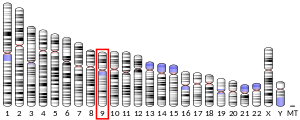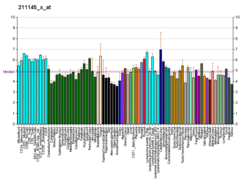IFNA21
Protein-coding gene in the species Homo sapiens
| IFNA21 | |||||||||||||||||||||||||||||||||||||||||||||||||||
|---|---|---|---|---|---|---|---|---|---|---|---|---|---|---|---|---|---|---|---|---|---|---|---|---|---|---|---|---|---|---|---|---|---|---|---|---|---|---|---|---|---|---|---|---|---|---|---|---|---|---|---|
| Identifiers | |||||||||||||||||||||||||||||||||||||||||||||||||||
| Aliases | IFNA21, IFN-alphaI, LeIF F, leIF-F, interferon, alpha 21, interferon alpha 21 | ||||||||||||||||||||||||||||||||||||||||||||||||||
| External IDs | OMIM: 147584; MGI: 2667155; HomoloGene: 88661; GeneCards: IFNA21; OMA:IFNA21 - orthologs | ||||||||||||||||||||||||||||||||||||||||||||||||||
| |||||||||||||||||||||||||||||||||||||||||||||||||||
| |||||||||||||||||||||||||||||||||||||||||||||||||||
| |||||||||||||||||||||||||||||||||||||||||||||||||||
| |||||||||||||||||||||||||||||||||||||||||||||||||||
| |||||||||||||||||||||||||||||||||||||||||||||||||||
| Wikidata | |||||||||||||||||||||||||||||||||||||||||||||||||||
| |||||||||||||||||||||||||||||||||||||||||||||||||||
Interferon alpha-21 is a protein that in humans is encoded by the IFNA21 gene.[5][6]
References
- ^ a b c GRCh38: Ensembl release 89: ENSG00000137080 – Ensembl, May 2017
- ^ a b c GRCm38: Ensembl release 89: ENSMUSG00000063376 – Ensembl, May 2017
- ^ "Human PubMed Reference:". National Center for Biotechnology Information, U.S. National Library of Medicine.
- ^ "Mouse PubMed Reference:". National Center for Biotechnology Information, U.S. National Library of Medicine.
- ^ Olopade OI, Bohlander SK, Pomykala H, Maltepe E, Van Melle E, Le Beau MM, Diaz MO (Dec 1992). "Mapping of the shortest region of overlap of deletions of the short arm of chromosome 9 associated with human neoplasia". Genomics. 14 (2): 437–43. doi:10.1016/S0888-7543(05)80238-1. PMID 1385305.
- ^ "Entrez Gene: IFNA21 interferon, alpha 21".
Further reading
- Goeddel DV, Leung DW, Dull TJ, et al. (1981). "The structure of eight distinct cloned human leukocyte interferon cDNAs". Nature. 290 (5801): 20–6. Bibcode:1981Natur.290...20G. doi:10.1038/290020a0. PMID 6163083. S2CID 1900300.
- Gren E, Berzin V, Jansone I, et al. (1985). "Novel human leukocyte interferon subtype and structural comparison of alpha interferon genes". J. Interferon Res. 4 (4): 609–17. doi:10.1089/jir.1984.4.609. PMID 6548765.
- Tiefenbrun N, Melamed D, Levy N, et al. (1996). "Alpha interferon suppresses the cyclin D3 and cdc25A genes, leading to a reversible G0-like arrest". Mol. Cell. Biol. 16 (7): 3934–44. doi:10.1128/MCB.16.7.3934. PMC 231390. PMID 8668211.
- Hussain M, Gill DS, Liao MJ (1997). "Identification of interferon-alpha 7, -alpha 14, and -alpha 21 variants in the genome of a large human population". J. Interferon Cytokine Res. 16 (10): 853–9. doi:10.1089/jir.1996.16.853. PMID 8910771.
- Kawaguchi N, Yamada T, Yoshiyama Y (1997). "[Expression of interferon-alpha mRNA in human brain tissues]". No to Shinkei. 49 (1): 69–73. PMID 9027905.
- Nyman TA, Tölö H, Parkkinen J, Kalkkinen N (1998). "Identification of nine interferon-alpha subtypes produced by Sendai virus-induced human peripheral blood leucocytes". Biochem. J. 329 (Pt 2): 295–302. doi:10.1042/bj3290295. PMC 1219044. PMID 9425112.
- Strausberg RL, Feingold EA, Grouse LH, et al. (2003). "Generation and initial analysis of more than 15,000 full-length human and mouse cDNA sequences". Proc. Natl. Acad. Sci. U.S.A. 99 (26): 16899–903. Bibcode:2002PNAS...9916899M. doi:10.1073/pnas.242603899. PMC 139241. PMID 12477932.
- Gerhard DS, Wagner L, Feingold EA, et al. (2004). "The Status, Quality, and Expansion of the NIH Full-Length cDNA Project: The Mammalian Gene Collection (MGC)". Genome Res. 14 (10B): 2121–7. doi:10.1101/gr.2596504. PMC 528928. PMID 15489334.
- v
- t
- e
- See here instead.
| Erythropoietin |
|
|---|---|
| G-CSF (CSF3) |
|
| GM-CSF (CSF2) |
|
| M-CSF (CSF1) |
|
| SCF (c-Kit) |
|
| Thrombopoietin |
|
| IFNAR (α/β, I) |
|
|---|---|
| IFNGR (γ, II) |
|
| IFNLR (λ, III) |
|
- See here instead.
- See here instead.
- See here instead.
| JAK (inhibitors) |
| ||||||||
|---|---|---|---|---|---|---|---|---|---|
| Others |
|
 | This article on a gene on human chromosome 9 is a stub. You can help Wikipedia by expanding it. |
- v
- t
- e


















